Digital Advertising Financial Model Excel Template
This Excel developed Digital Advertising Financial Model provides a structured framework to analyze financial health and agency profitability. Develop projection strategies and monitor expenditure.
Financial Model Overview for a Digital Advertising Agency
This digital agency financial model involves projecting the agency’s financial performance over a period of years. The model will include three core financial statements: the Income Statement, Cash Flow Statement, and Balance Sheet.
5-Year 3 Statement model with both a 6-tier subscription (as many digital advertising agencies raise revenue via those services) and PAYG project-based revenue, fully editable and ready to use.
Income Statement
The Income Statement (or Profit and Loss Statement) summarizes the agency’s revenues, costs, and expenses over a period, resulting in net profit or loss.
Revenue
Service Revenue: Revenue from core services such as:
Social media management
Search engine marketing (SEM)
Display advertising
Content creation
Influencer marketing
Analytics and reporting
Retainer Fees: Monthly fixed fees from clients for ongoing services.
Project-Based Revenue: One-time fees for specific campaigns or projects.
Performance-Based Revenue: Revenue tied to campaign performance metrics (e.g., cost-per-click or cost-per-acquisition).
Cost of Goods Sold (COGS)
Direct Labor: Salaries of advertising agency employees directly involved in service delivery (e.g., account managers, designers, copywriters).
Software/Tools: Costs of tools like Google Ads, Facebook Ads Manager, analytics platforms, and design software.
Third-Party Costs: Payments to external vendors (e.g., influencers, media buying platforms).
Hosting and Infrastructure: Costs for hosting websites or ad servers.
Gross Profit
Gross Profit = Revenue – COGS
Operating Expenses
Salaries and Wages: Non-billable staff (e.g., management, HR, finance).
Marketing and Sales: Costs for acquiring new clients (e.g., advertising, events, commissions).
Rent and Utilities: Office space costs (if applicable).
Technology and IT: Maintenance of hardware, software, and IT support.
Professional Services: Legal, accounting, and consulting fees.
Depreciation and Amortization: Allocation of capital expenses over time.
Operating Income
Operating Income = Gross Profit – Operating Expenses
Non-Operating Items
Interest Income/Expense: Interest earned or paid on loans or investments.
Taxes: Corporate income taxes.
Net Income
Net Income = Operating Income + Non-Operating Items – Taxes
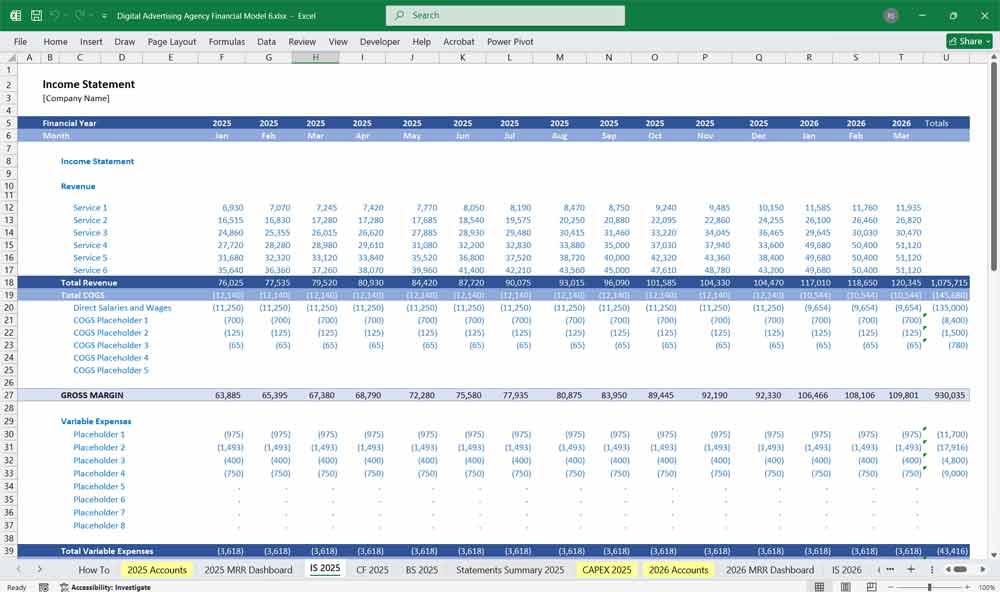
Digital Advertising Financial Model Cash Flow Statement
The Cash Flow Statement tracks the inflow and outflow of cash, divided into operating, investing, and financing activities.
Operating Activities
Cash from Clients: Payments received from clients for services rendered.
Cash Paid to Suppliers/Vendors: Payments for software, tools, and third-party services.
Salaries and Wages: Payments to employees.
Taxes Paid: Cash outflows for taxes.
Net Cash from Operating Activities: Total cash generated or used in operations.
Investing Activities
Capital Expenditures (CapEx): Purchases of equipment, software, or office improvements.
Investments: Cash used for investments in other businesses or financial instruments.
Net Cash from Investing Activities: Total cash used in investing activities.
Financing Activities
Debt Repayment: Repayment of loans or credit lines.
Equity Issuance: Cash raised from issuing shares (if applicable).
Dividends Paid: Cash distributed to shareholders (if applicable).
Net Cash from Financing Activities: Total cash generated or used in financing activities.
Net Change in Cash
Net Change in Cash = Net Cash from Operating Activities + Net Cash from Investing Activities + Net Cash from Financing Activities
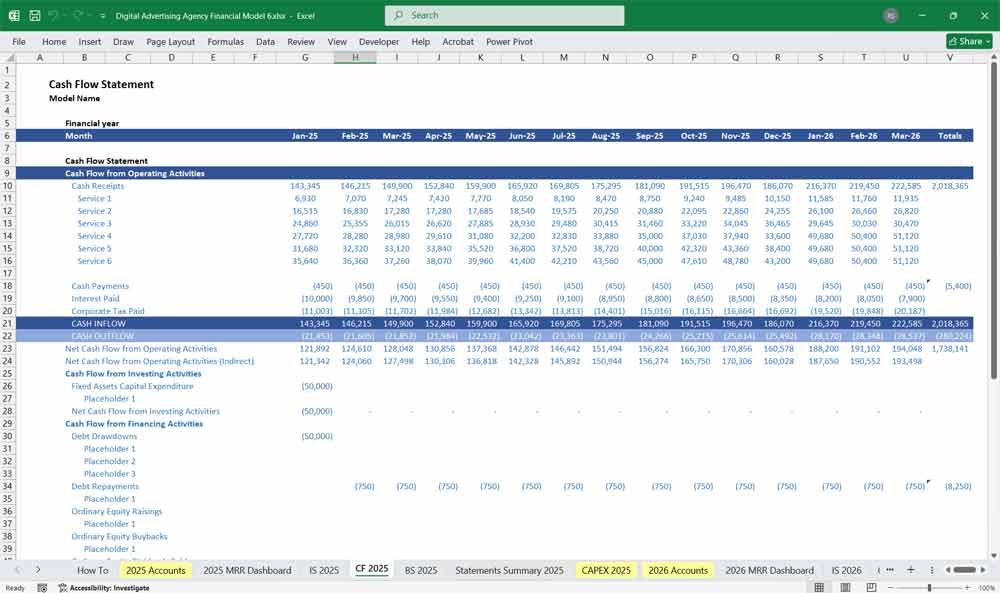
Digital Advertising Financial Model Balance Sheet
The Balance Sheet provides a snapshot of the agency’s financial position at a specific point in time, showing assets, liabilities, and equity.
Assets
Current Assets:
Cash and Cash Equivalents: Cash on hand and in bank accounts.
Accounts Receivable: Amounts owed by clients for services rendered.
Prepaid Expenses: Payments made in advance (e.g., software subscriptions).
Non-Current Assets:
Property, Plant, and Equipment (PPE): Office equipment, computers, and furniture.
Intangible Assets: Intellectual property, trademarks, or proprietary tools.
Liabilities
Current Liabilities:
Accounts Payable: Amounts owed to suppliers or vendors.
Accrued Expenses: Unpaid wages, taxes, or other obligations.
Deferred Revenue: Payments received in advance for services not yet delivered.
Non-Current Liabilities:
Long-Term Debt: Loans or credit lines with a maturity of more than one year.
Equity
Shareholder Equity: Owner’s equity or retained earnings.
Retained Earnings: Cumulative net income retained in the business.
Balance Sheet Equation
Assets = Liabilities + Equity
Key Assumptions and Drivers
To build the financial model, you’ll need to define key assumptions and drivers, such as:
Revenue Growth Rate: Based on market trends, client acquisition, and retention rates.
Client Churn Rate: Percentage of clients lost annually.
Average Revenue per Client (ARPC): Average revenue generated per client.
Employee Costs: Salaries, benefits, and hiring plans.
Operating Expenses as a % of Revenue: Historical or industry benchmarks.
Capital Expenditures: Planned investments in technology or infrastructure.
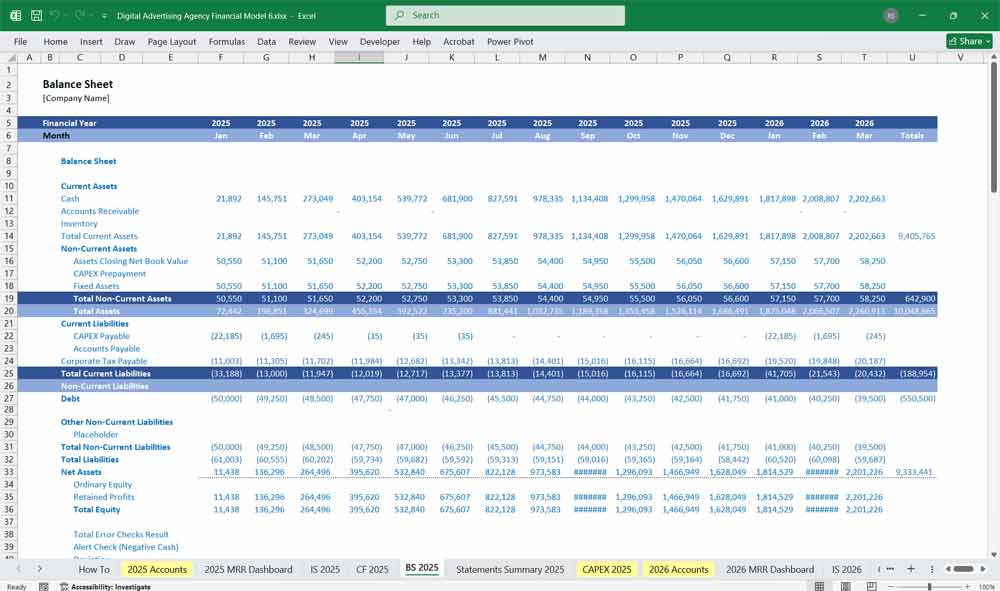
6-Tier subscription model for a Digital Advertising Agency
A 6-Tier Subscription Model for a digital advertising agency is a pricing strategy that offers clients different levels of service at varying price points. Each tier provides a distinct set of features, resources, and deliverables, catering to different client needs and budgets.
1. Basic Digital Advertising Tier
Target Audience: Small businesses or startups with limited budgets and minimal advertising needs.
Features:
Ad Campaign Management: Management of 1-2 ad campaigns (e.g., Facebook Ads or Google Ads).
Monthly Reporting: Basic performance reports (e.g., impressions, clicks, conversions).
Ad Copy and Creative: Standard ad copywriting and basic creative design.
Support: Email support with a 48-hour response time.
Pricing:
500−500−1,000 per month.
Deliverables:
1-2 ad campaigns managed.
1 monthly performance report.
Up to 4 ad creatives per month.
2. Starter Digital Advertising Tier
Target Audience: Small to medium-sized businesses looking for more comprehensive support.
Features:
Ad Campaign Management: Management of 3-4 ad campaigns across multiple platforms (e.g., Facebook, Google, Instagram).
Advanced Reporting: Detailed performance reports with insights and recommendations.
Ad Copy and Creative: Custom ad copywriting and enhanced creative design.
A/B Testing: Basic A/B testing for ad creatives and targeting.
Support: Email and chat support with a 24-hour response time.
Pricing:
1,500−1,500−2,500 per month.
Deliverables:
3-4 ad campaigns managed.
1 detailed performance report with insights.
Up to 8 ad creatives per month.
A/B testing for 2 ad variations.
3. Growth Digital Advertising Tier
Target Audience: Medium-sized businesses aiming to scale their advertising efforts.
Features:
Ad Campaign Management: Management of 5-7 ad campaigns across multiple platforms.
Comprehensive Reporting: Advanced analytics with actionable insights and quarterly reviews.
Ad Copy and Creative: Premium ad copywriting and high-quality creative design.
A/B Testing: Advanced A/B testing for multiple ad variations.
Audience Targeting: Custom audience segmentation and targeting strategies.
Support: Dedicated account manager with weekly check-ins.
Pricing:
3,000−3,000−5,000 per month.
Deliverables:
5-7 ad campaigns managed.
1 comprehensive performance report with quarterly reviews.
Up to 12 ad creatives per month.
A/B testing for 4 ad variations.
Custom audience targeting strategies.
4. Professional Digital Advertising Tier
Target Audience: Established businesses with significant advertising budgets and complex needs.
Features:
Ad Campaign Management: Management of 8-10 ad campaigns across multiple platforms.
Advanced Analytics: Real-time dashboards, custom KPIs, and monthly strategy sessions.
Ad Copy and Creative: Highly customized ad copywriting and premium creative design.
A/B Testing: Extensive A/B testing for multiple ad variations and landing pages.
Audience Targeting: Advanced audience segmentation, retargeting, and lookalike audiences.
Content Creation: Additional content creation (e.g., blog posts, videos) to support campaigns.
Support: Dedicated account manager with bi-weekly strategy calls.
Pricing:
6,000−6,000−10,000 per month.
Deliverables:
8-10 ad campaigns managed.
Real-time dashboards and custom KPIs.
Up to 20 ad creatives per month.
A/B testing for 6 ad variations.
Advanced audience targeting and retargeting.
2-3 pieces of additional content per month.
5. Enterprise Digital Advertising Tier
Target Audience: Large businesses or corporations with extensive advertising needs and budgets.
Features:
Ad Campaign Management: Management of 10+ ad campaigns across multiple platforms.
Custom Analytics: Tailored analytics, predictive modeling, and quarterly business reviews.
Ad Copy and Creative: Highly customized ad copywriting and premium creative design.
A/B Testing: Comprehensive A/B testing for ad variations, landing pages, and customer journeys.
Audience Targeting: Advanced audience segmentation, retargeting, and lookalike audiences.
Content Creation: Extensive content creation (e.g., blog posts, videos, infographics) to support campaigns.
Dedicated Team: A dedicated team of specialists (e.g., strategists, designers, analysts).
Support: Dedicated account manager with weekly strategy calls and 24/7 priority support.
Pricing:
12,000−12,000−20,000 per month.
Deliverables:
10+ ad campaigns managed.
Custom analytics and predictive modeling.
Up to 30 ad creatives per month.
A/B testing for 10+ ad variations.
Advanced audience targeting and retargeting.
5+ pieces of additional content per month.
Dedicated team of specialists.
6. Custom Digital Advertising Tier
Target Audience: Clients with unique or highly specialized needs that don’t fit into standard tiers.
Features:
Fully Customizable: Tailored solutions based on the client’s specific requirements.
Ad Campaign Management: Unlimited ad campaigns across multiple platforms.
Custom Analytics: Bespoke analytics, predictive modeling, and real-time dashboards.
Ad Copy and Creative: Fully customized ad copywriting and creative design.
A/B Testing: Comprehensive A/B testing for all aspects of campaigns.
Audience Targeting: Advanced and custom audience segmentation strategies.
Content Creation: Extensive content creation tailored to the client’s brand.
Dedicated Team: A dedicated team of specialists and strategists.
Support: Dedicated account manager with daily check-ins and 24/7 priority support.
Pricing:
$25,000+ per month (custom pricing based on scope).
Deliverables:
Fully customized advertising strategy.
Unlimited ad campaigns managed.
Bespoke analytics and reporting.
Unlimited ad creatives.
Comprehensive A/B testing.
Advanced and custom audience targeting.
Extensive content creation.
A dedicated team of specialists.
Key Considerations for the Subscription Model
Scalability: Ensure each tier can scale with the client’s growth.
Flexibility: Allow clients to upgrade or downgrade tiers as their needs change.
Value Proposition: Clearly communicate the value and ROI of each tier.
Onboarding: Provide a seamless onboarding process for new clients.
Retention: Offer incentives for long-term commitments (e.g., discounts for annual subscriptions).
This 6-tier subscription model allows the digital advertising agency to cater to a wide range of clients while maximizing revenue potential and ensuring client satisfaction.
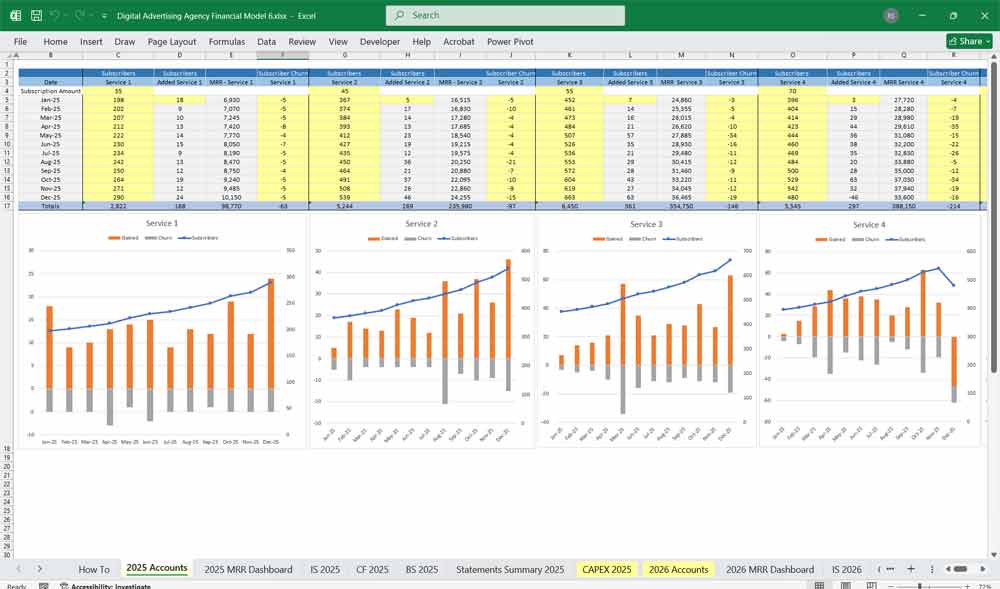
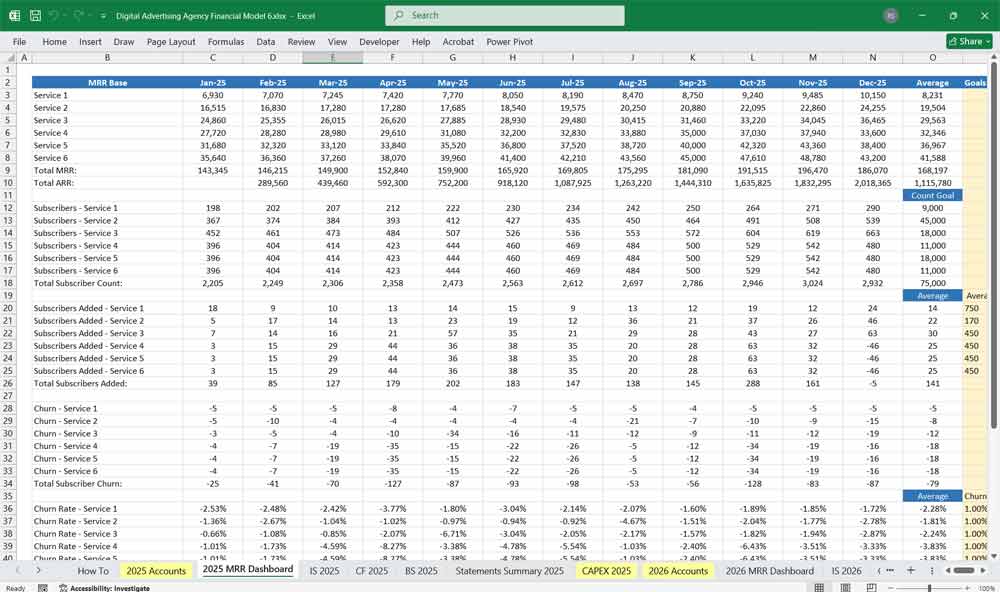
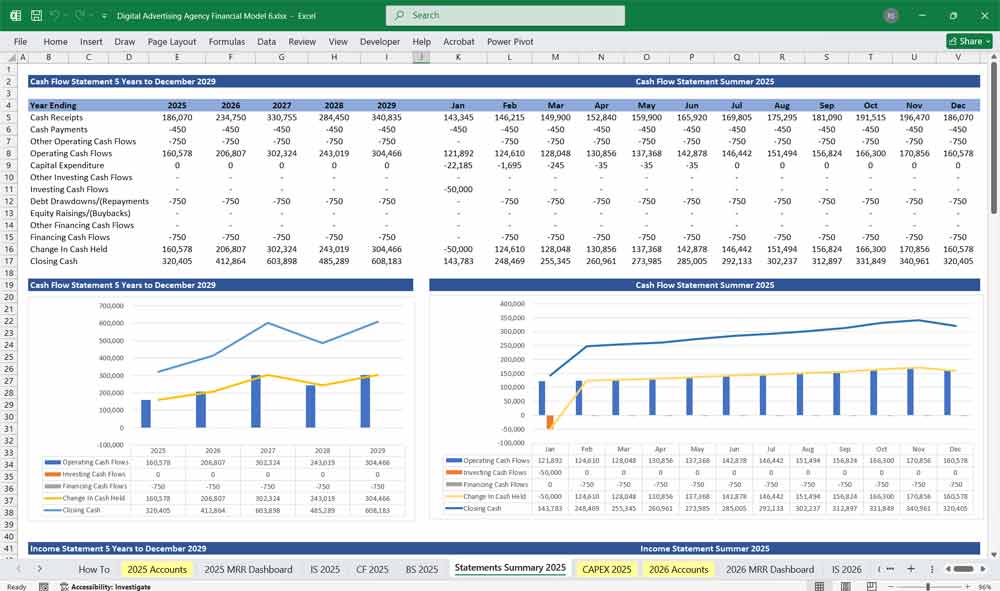
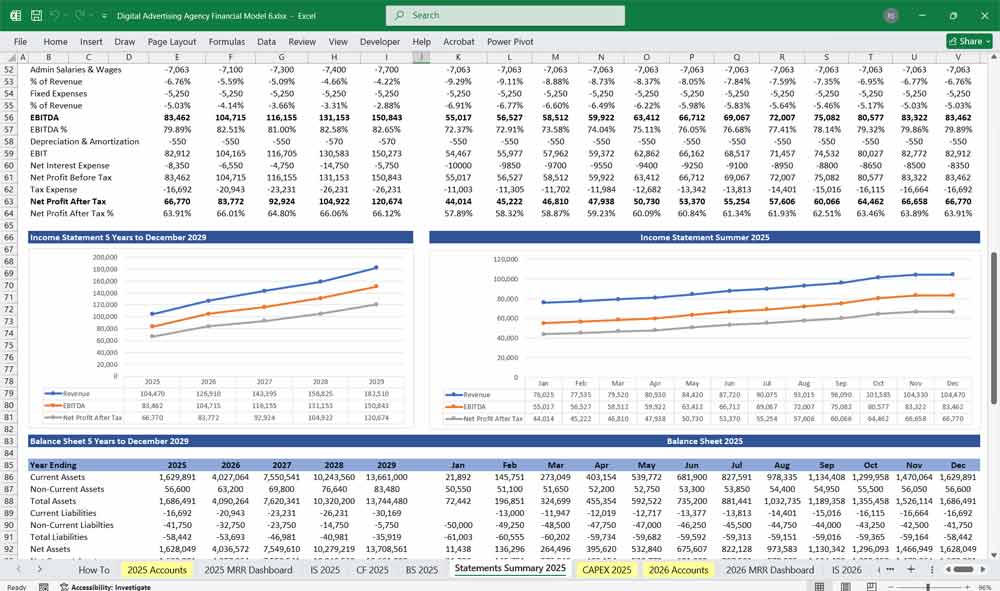
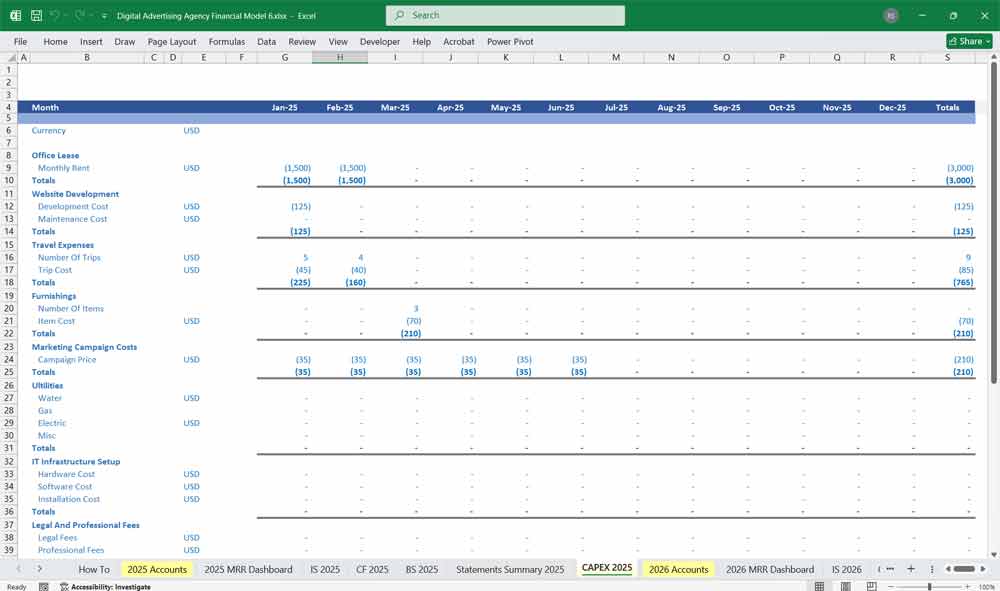
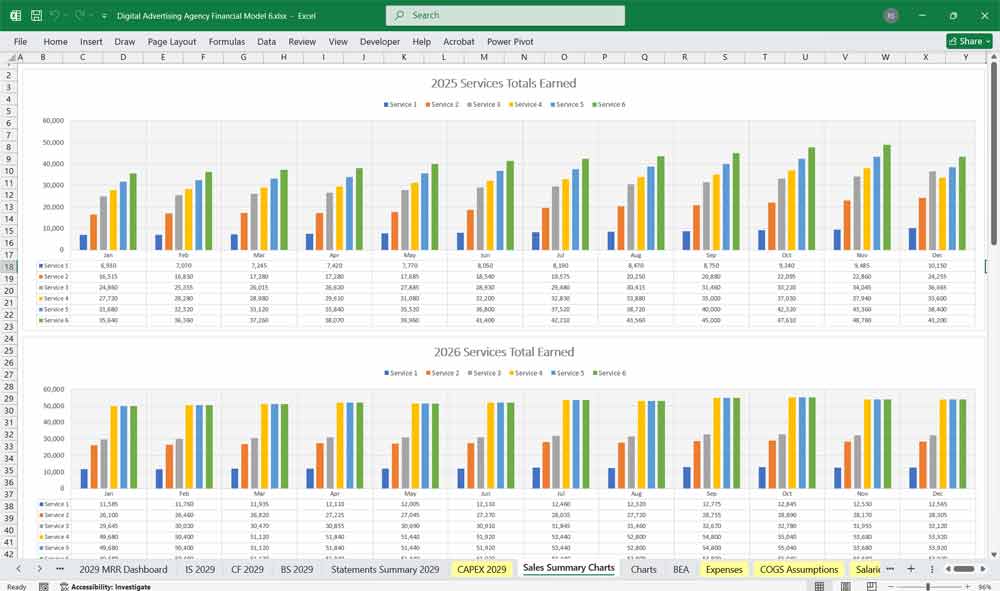
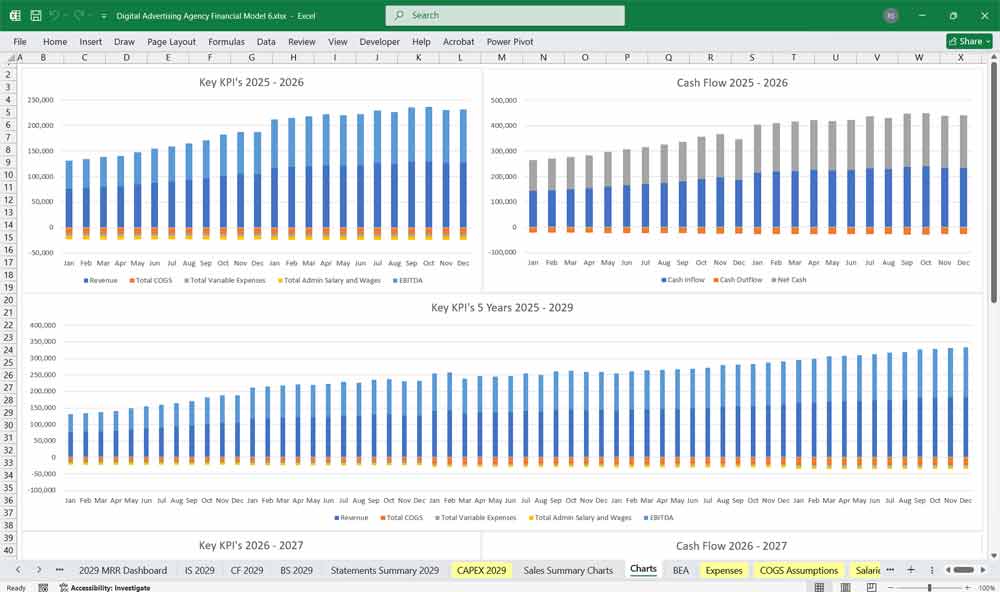
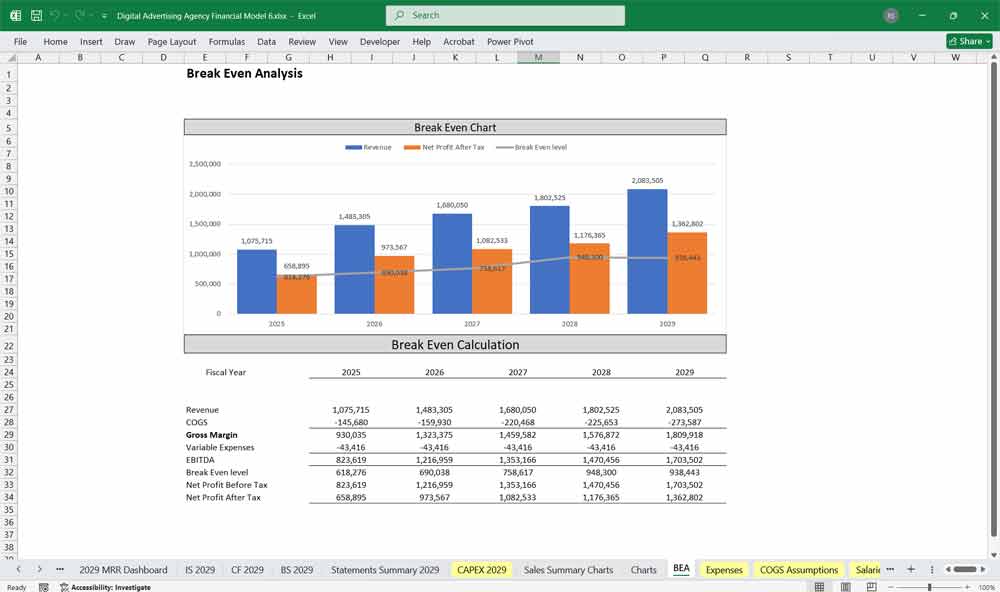
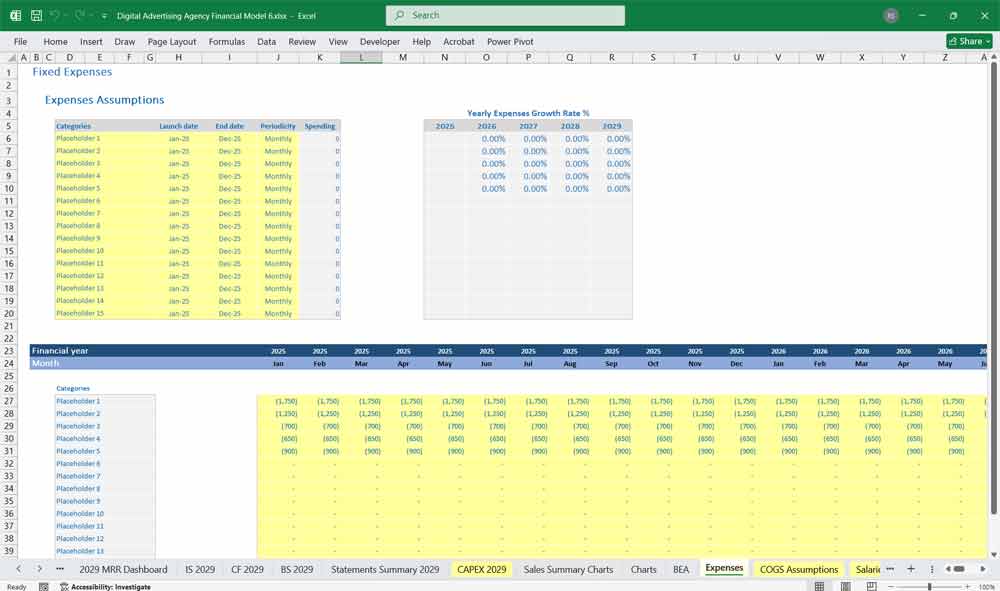
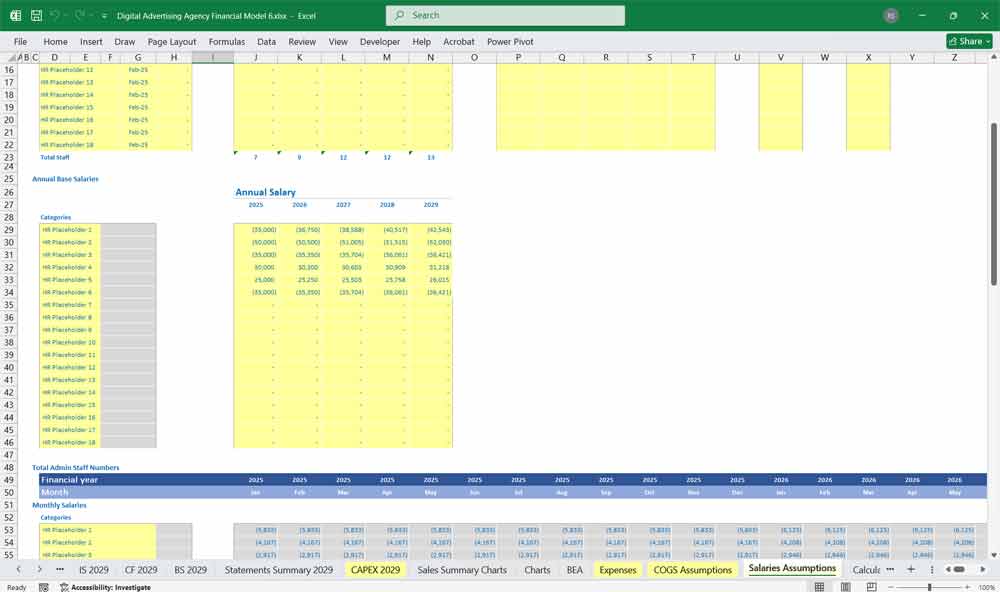
Scenario Analysis for the Financial Model
Include sensitivity or scenario analysis to test how changes in key assumptions (e.g., revenue growth, client churn, or cost structure) impact the financials. For example:
Base Case: Moderate growth and expense assumptions.
Optimistic Case: Higher revenue growth and lower costs.
Pessimistic Case: Lower revenue growth and higher costs.
Outputs and Metrics
Profit Margins: Gross, operating, and net profit margins.
Cash Flow Metrics: Free cash flow, cash burn rate (if applicable).
Liquidity Ratios: Current ratio, quick ratio.
Leverage Ratios: Debt-to-equity ratio.
Return on Equity (ROE): Net income divided by shareholder equity.
This financial model will help the digital advertising agency plan for growth, manage cash flow, and make informed strategic decisions. It can also be used to attract investors or secure financing by demonstrating the agency’s financial viability.
Download Link On Next Page
